Since September 2017, all neo-professed legionaries destined to study the humanities spend this stage at the Novitiate and College of Humanities in Cheshire, Connecticut (United States).
The Arrival of the New Humanists
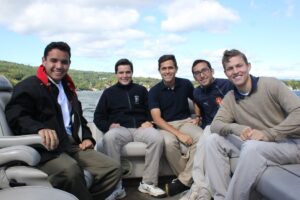 During August and early September, religious humanists from the novitiates of Mexico, Colombia, Venezuela, Spain, and Germany joined the Cheshire community. This circumstance has brought great cultural enrichment; the community of humanists currently includes 66 legionaries from 14 countries.
During August and early September, religious humanists from the novitiates of Mexico, Colombia, Venezuela, Spain, and Germany joined the Cheshire community. This circumstance has brought great cultural enrichment; the community of humanists currently includes 66 legionaries from 14 countries.
“I came [from Salamanca] to Cheshire in the last group of brothers,” comments Brother Daniel de Tezanos, LC, who is in his first year of humanities, “but from the very first moment I felt at home because the Center was full of brothers and fathers who gave me a warm welcome. That really helped me adapt.”
Second-year humanist legionaries saw this community expansion as a special mission. Brother Nils Schäfer, LC, commented on this: “We have made a great effort to build a united community that vibrates with the experience of Christ. The openness and fervor of the new legionaries who arrived have helped us a lot. For those of us in our second year, this was especially important to form a community of fervent religious, deeply rooted and centered on Christ.”
Implementation of the Ratio institutionis (Christus vita vestra)
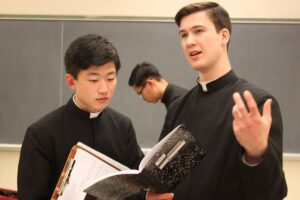 “It is a blessing and a great experience to have entire generations of legionaries here preparing for Rome in an international and formative community life,” comments Father Kevin Meehan, LC, rector of the center. “One of the priorities in recent years has been to understand and implement the new Ratio institutionis in the humanities.”
“It is a blessing and a great experience to have entire generations of legionaries here preparing for Rome in an international and formative community life,” comments Father Kevin Meehan, LC, rector of the center. “One of the priorities in recent years has been to understand and implement the new Ratio institutionis in the humanities.”
Another important aspect, according to Father Kevin, is the value of this training stage to foster human maturity, including the integration of the emotional world. This is a task that aligns with the study of the humanities, where the depths of the human heart are explored.
All training is carried out “in a mission-oriented key,” and although for the humanists the study is “their main apostolate,” throughout the year the brothers have opportunities to participate in missions and events, collaborate in parishes, accompany some fathers, and attend conventions and other activities of Regnum Christi at local and national levels.
Study Program
The 2018-2019 academic year served as a transition toward an updated humanities curriculum. During meetings held in late April among all teachers and trainers in Cheshire with Father Devin Roza, LC, general prefect of studies, a program was developed to better foster study skills, maximize study time, and continue meeting Connecticut state requirements to award the degree of “associate” (Associate Degree).
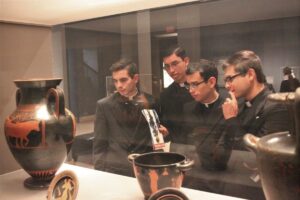 “In the new curriculum, history courses (Western civilization), theory and history of art and music, and universal literature follow a parallel historical course: when studying historical events of the Renaissance in history, they read the most important Renaissance writings in literature, analyze artistic developments of the period in art class, and familiarize themselves with classical polyphony in music class. This program is now carried out over three semesters to also offer optional courses to deepen topics such as ‘the currents of contemporary culture,’ ‘art as legionary apostolate,’ and even ‘athletics, ancient and modern.’ Everyone appreciates this possibility of specialization and deepening in the humanities,” commented Father Andreas Kramarz, LC.
“In the new curriculum, history courses (Western civilization), theory and history of art and music, and universal literature follow a parallel historical course: when studying historical events of the Renaissance in history, they read the most important Renaissance writings in literature, analyze artistic developments of the period in art class, and familiarize themselves with classical polyphony in music class. This program is now carried out over three semesters to also offer optional courses to deepen topics such as ‘the currents of contemporary culture,’ ‘art as legionary apostolate,’ and even ‘athletics, ancient and modern.’ Everyone appreciates this possibility of specialization and deepening in the humanities,” commented Father Andreas Kramarz, LC.
Another means of deepening is a more extensive written work (Capstone) that second-year religious prepare on a topic of their own choosing. They conduct research with the help of one of the teachers and the librarian. At the end of the course, they present their topics at an academy attended by the entire community.
Of the 66 humanists, only 12 have English as their native language. To ensure good learning of this language, external teachers are hired to offer new humanists a professional crash course before the start of the program. English courses are also offered during the academic year for those who need them.
English is not only a practical matter. According to Brother Leonardo González, LC, “[Learning English] has been a help to understand another culture better.” Brother Daniel de Tezanos, LC, describes his experience: “I was scared because I didn’t have a good level of English, but in these two months I’ve had an incredible time and enjoy the classes and fraternal life with all the brothers. The entire environment of life and formation really helps a lot to learn English well.”
However, the humanities program in Cheshire also aims for Spanish-speaking religious to learn and strengthen their style and oratory in their own language. Father Miguel Ángel de la Torre, LC, new member of the teaching team, offers these courses in Spanish. Over the past year, Father Miguel Ángel has guided his students to write articles and prepare sermons for Hispanic communities around Cheshire.
“What I like most about the humanities training period is showing the brothers that these two years of learning will serve for their apostolate. It’s very valuable to be able to dedicate time to improve oral and written communication, to read authors who show great knowledge of the human heart and mind, and to deepen the ideas that have guided the history of the world through the centuries. People want and need priests who understand them and guide them,” commented Father Miguel Ángel de la Torre, LC.
Extracurricular Activities
Academic work is not limited only to classes and studies. Father Andreas Kramarz, LC, prefect of studies, has sought to enrich humanistic education with various cultural outings and other activities.
The location of the Humanities Center allows them to visit some of the most exquisite art museums on the American continent each year: in New York (the Metropolitan Museum of Art MET, the Frick Collection, the Museum of Modern Art MoMA), Boston (the Museum of Fine Arts MFA, the Isabella Stewart Gardner Museum), and Yale University (Yale Art Gallery, the Center for British Art), among others.
On these visits, they not only admire the works on display but also incorporate visits to other areas through written assignments in the art course and articles for the center’s blog.
Yale University, 22 kilometers from the center, hosts several classical music concerts each year. Humanists are encouraged to attend some of these concerts for live performances of cultural heritage pieces. Father Andreas, who teaches music theory and history, also organizes some classical music listening sessions in the center’s auditorium.
The Humanities Center has a longstanding tradition of organizing public lectures on topics that broaden the horizons of humanists, delivered by one of the center’s teachers or an invited speaker. “The Testimony of an Icon Restorer,” “The Presence of Mathematics in Nature,” “The Relationship of Aeneas and Dido in Book IV of the Aeneid,” and “Historical Facts of Galileo Galilei’s Trial” are some of the topics covered in these lectures.
Starting this year, a group of second-year humanists has prepared a historical tour through Boston for first-year brothers. This city witnessed some of the most significant events and battles at the beginning of U.S. history. Father John Bender, LC, assistant to the humanists, is currently exploring the possibility of visiting other important sites to offer greater cultural enrichment.
The academic program of the humanities in Cheshire aims not only to enrich the general culture of the religious but also to enrich them as persons, with a better understanding of man and a greater desire to seek and love the truth.
This program was organized with the conviction of the importance of the humanities for our legionary mission, and legionary and lay teachers seek to instill this sense of mission in their classes. Brother Mario Ciaston, LC, describes his experience: “The humanities are a challenge, but they are very interesting and shape us in various aspects. I didn’t expect to enjoy studies, and although sometimes studying is more difficult, I really feel happy learning much more about man, our history, and our culture. I understand better each day the global vision and the connection found in many aspects between the past and the present, allowing me to better understand our present and society. This will be and already is, from now on, a great value in the apostolate. The humanities provide us with an essential part of our formation.”
“The world is changing rapidly. We, as legionaries, have the mission to ask for the Holy Spirit’s light so that our formation aligns with the task of leading man of the 21st century to God through the paths of His Mystical Body. I believe that our community of humanists, formed by brothers from 14 countries, is a good melting pot of experiences on how to live as brothers captivated by the same fire of God for the same mission in Regnum Christi. I thank God for the opportunity to serve my brothers as a teacher and spiritual director,” commented Father Miguel Ángel de la Torre, LC.
“All the trainers in Cheshire are aware of the importance of their role in the formation of the humanist brothers. At this stage, which is in the early years of religious life, the foundations are laid upon which their entire future as legionaries is built. Whether in class or in personal dialogue, trainers seek to help the brothers prepare for their future mission.”



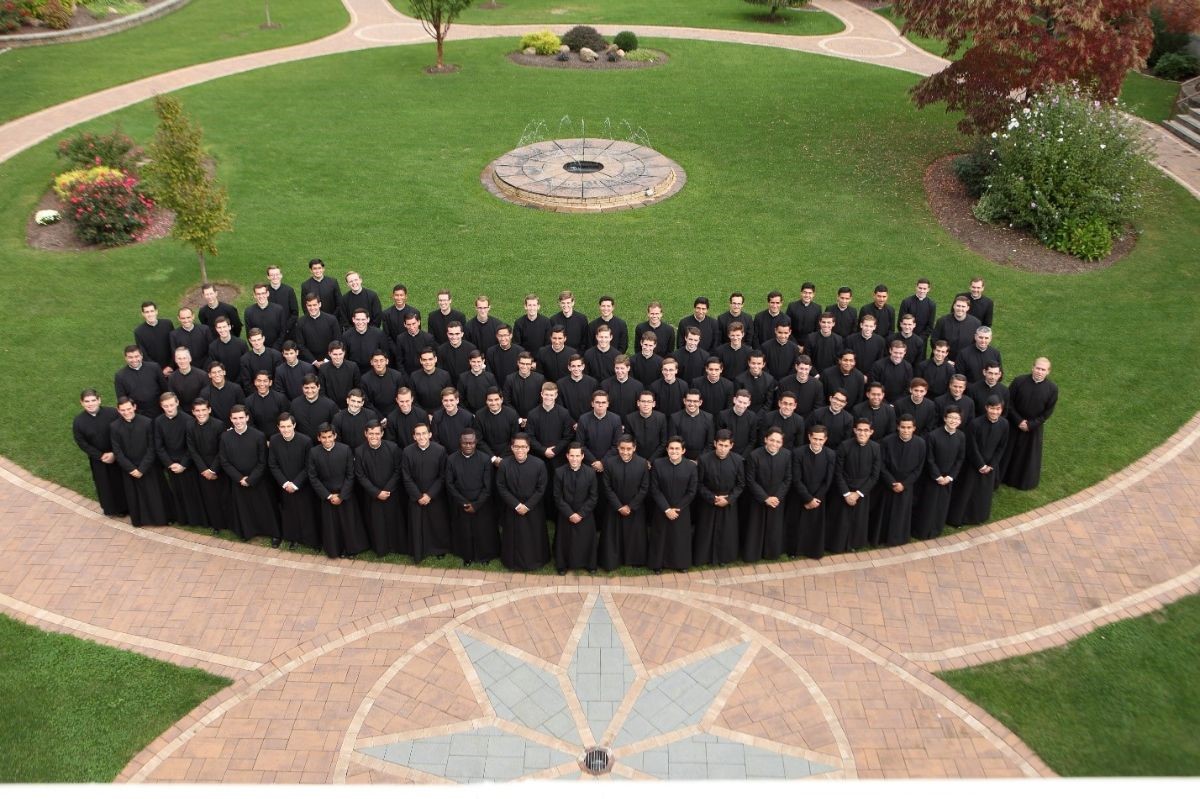
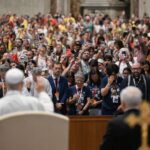






1 Comment.
[…] así como por miembros de toda la familia Regnum Christi. El H. Miguel iniciará sus estudios de Humanidades en Cheshire (Estados Unidos) y el H. Armando viaja a Roma a estudiar Filosofía. Los hermanos Miguel y […]